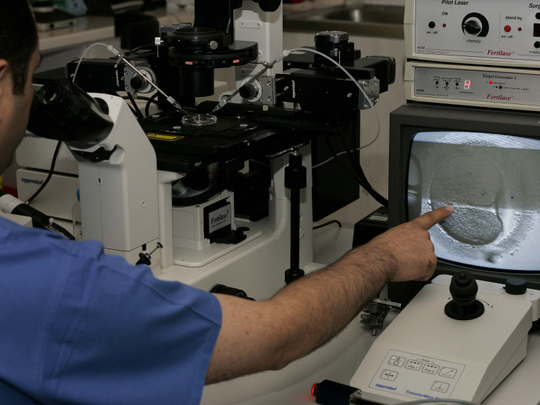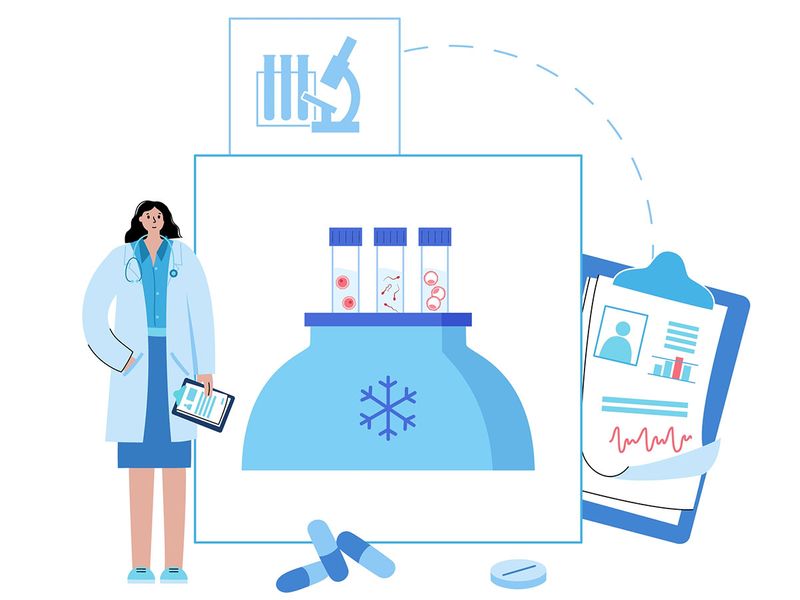
Gulf News reader Erum Arif, who is 30 years old, is mulling getting her eggs frozen. And while there are provisions for this sort of fertility preservation in the UAE, she is wondering if her marital status – she is unmarried – requires a specific process. She also asked us about annual fees for keeping the eggs and whether one could donate their frozen eggs. We asked the experts in the field to weigh in – this is what they had to say:
First, what exactly is egg freezing?
Maria Banti, Senior Clinical Embryologist and IVF Laboratory Director at UAE-based Orchid Fertility, explains, “Egg freezing, also known as oocyte cryopreservation, is a method that allows women to store their eggs and use them at a later stage in life. It is an option for those who are not ready to get pregnant now, but would like to have children in future. Egg quality declines as a woman gets older, so freezing your eggs at a younger age means that you pause the time. This allows women to use these younger eggs later in life, therefore having a higher chance of pregnancy and lower risk of miscarriage or having an unhealthy baby in comparison to trying naturally at an older age. For example, a 35-year-old woman can freeze her eggs and use them when she is 40. The eggs will still be 35 years old!”
What are some instances where you should consider it?
Dr Pankaj Shrivastav, Director at UAE-based Conceive Clinic, says the women who are looking to freeze their eggs usually do it for either medical or social reasons.
Medical reasons: “I’m seeing a lot of patients from oncologists; they are referred to us. That is, someone who has been diagnosed with breast cancer, or Hodgkin's Lymphoma or leukemia and they are going to have chemotherapy. Chemotherapy will render a person sterile by and large, so nowadays oncologists will refer them to us. Now there are such excellent treatments available that one assumes that they will be cured in the next three to four years, but by that time, because of all the chemotherapy or radiation they’ve had, they may not have many eggs left. So if we’ve got eggs banked those can be used to achieve pregnancy,” he explains.

I’m seeing a lot of patients from oncologists; they are referred to us. That is, someone who has been diagnosed with breast cancer, or Hodgkin's Lymphoma or leukemia and they are going to have chemotherapy. Chemotherapy will render a person sterile by and large ... if we’ve got eggs banked those can be used to achieve pregnancy.
Social reason: “And there’s also a social reason for egg freezing and that is, women who are single, haven’t found the right person to have a baby with but don’t want to miss the bus. So we are finding women at 32 or 34 or 36, coming to us saying, ‘I don’t know if I will find anyone but assuming I will or I hope I will and I don’t want to reach age 40, find the right person and realise that my eggs are almost finished’,” he adds.
How does egg freezing work?
Banti explains: “The whole process lasts approximately two weeks. The woman has to take medication to produce more eggs and visit the clinic regularly for blood tests and ultrasound scans. The eggs will be extracted while the woman is under anesthesia and will be frozen in the embryology lab on the same day. The eggs will be kept in liquid nitrogen at -196-degree-Celcius until it is time to use them. The storage period does not affect the egg quality. When the time comes, the eggs will be defrosted, fertilised in the laboratory and the embryos will be transferred to the woman’s uterus.”

Dr lamia Al Sayegh, Specialist Reproductive Medicine and Infertility at Fakih IVF Dubai says the process of egg freezing involves three steps. She explains them as
Stimulation and monitoring: During stimulation, the patients will receive subcutaneous injections of gonadotrophins (follicle-stimulating hormone and luteinizing hormone) for 10 to 12 days. She would be monitored during this time by serial ultrasounds and blood tests to ensure the follicle are growing adequately and are synchronized. Once they all reach an appropriate size, the patient is given a trigger shot as a preparation for the egg retrieval procedure.

Egg retrieval is done in a minimally invasive way, meaning it usually leaves no scars, needs no stitches and has a short recovery time.
Egg retrieval: This procedure is done in a minimally invasive way, meaning it usually leaves no scars, needs no stitches and has a short recovery time. It consists of introducing a needle through the vaginal cul de sac under ultrasound guidance and aspirating the follicles. It is a painless procedure since it is performed under sedatives. The procedure generally lasts only 10-15 minutes from the administration of anaesthesia to completion of the egg retrieval procedure.
Vitrification: A few hours after retrieval, only fully matured eggs will be frozen through a process called vitrification — a technique of rapid freezing in liquid nitrogen (which is 196 degrees below zero Celsius) to reduce the formation of ice crystals on the eggs and improve their survival rates.
Is it legal to freeze my eggs in the UAE?
She adds: “As per the UAE law, all married women are allowed to freeze their eggs. For single women, egg freezing can be performed as long as there is a valid medical reason (such as polycystic ovary syndrome, advanced maternal age (that is over 35), etc.) and approval from the Ministry of Health has been obtained. Once frozen, the eggs can be stored for up to five years and you should sign a consent every year to renew the storage.“

As per the UAE law, all married women are allowed to freeze their eggs. For single women, egg freezing can be performed as long as there is a valid medical reason.
What is the annual cost for freezing eggs?
As per the information on the Dubai Fertility Centre website, it costs Dh3,500 for oocyte freezing and the first year of storage.
Do you have a pregnancy or parenting-related question you would like to ask the Parenting team at Gulf News? We can get your query answered by the right experts - email parenting@gulfnews.com








